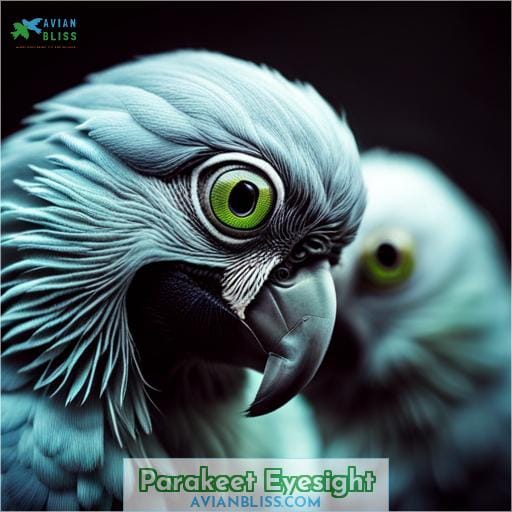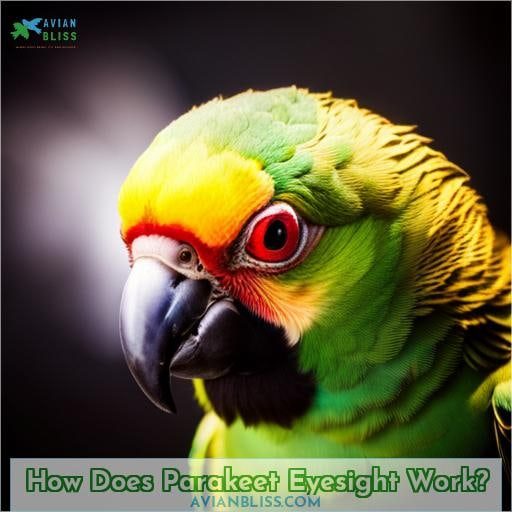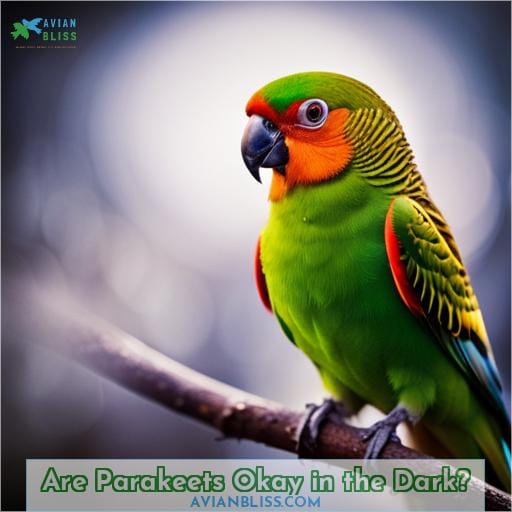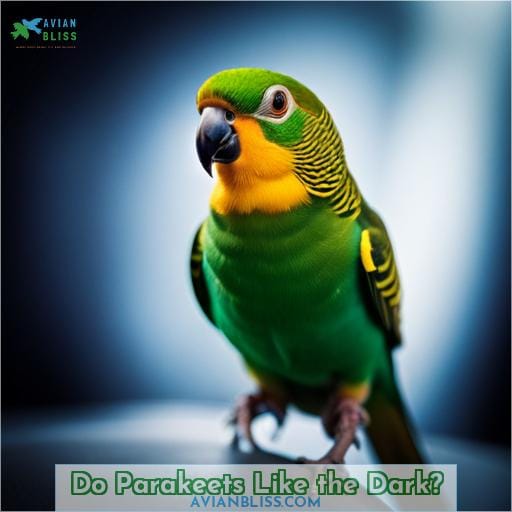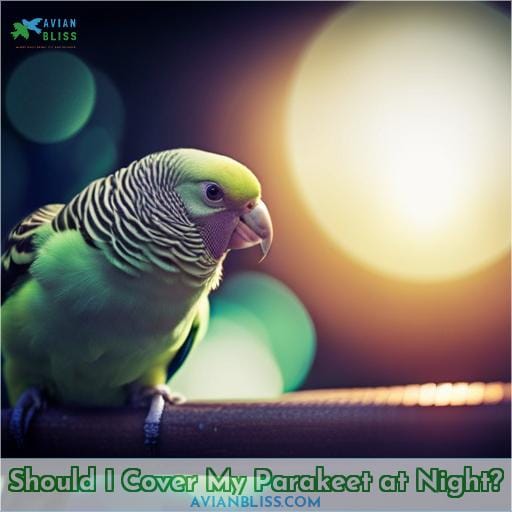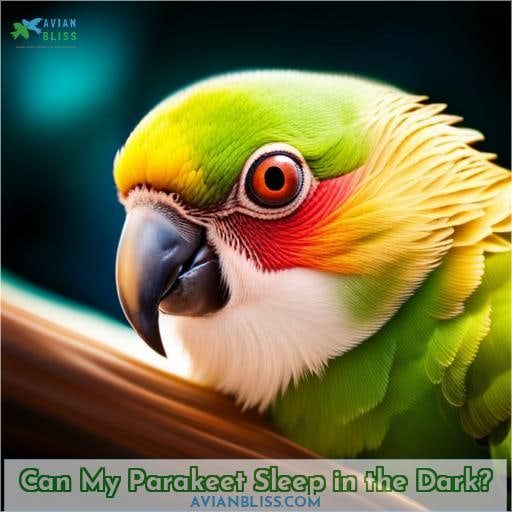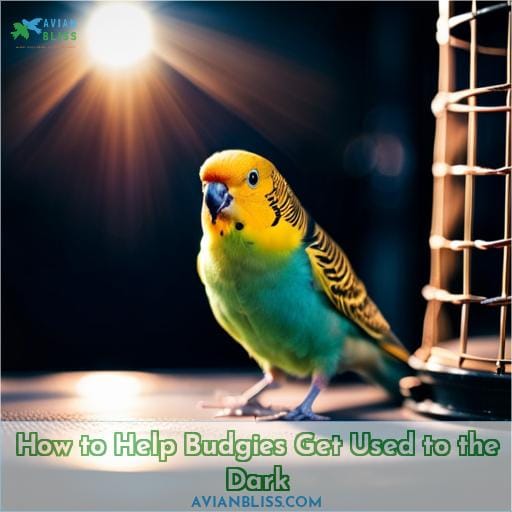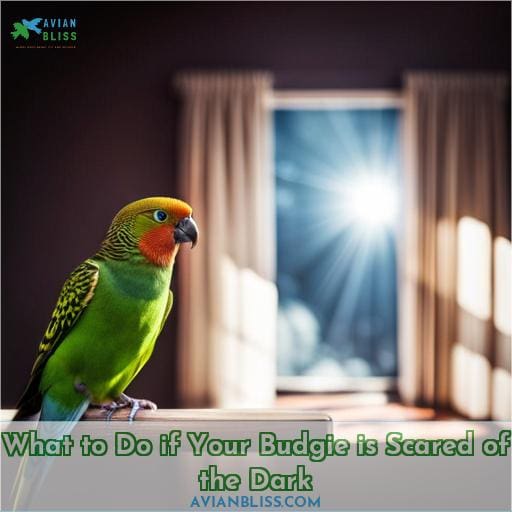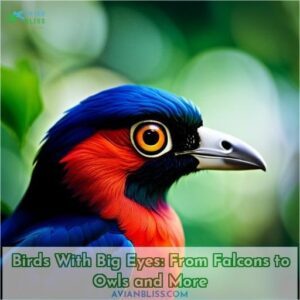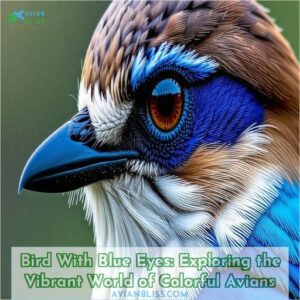This site is supported by our readers. We may earn a commission, at no cost to you, if you purchase through links.
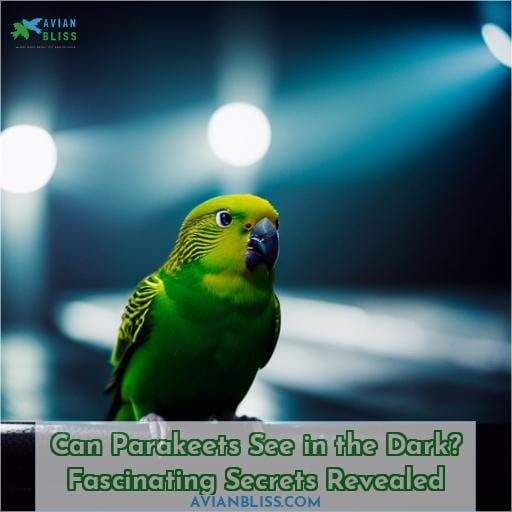 You’ve got secrets about your parakeet’s night vision, and satisfying your curiosity could strengthen your bond. As their trusted companion, understanding their exceptional eyes lets you see the world from their perspective.
You’ve got secrets about your parakeet’s night vision, and satisfying your curiosity could strengthen your bond. As their trusted companion, understanding their exceptional eyes lets you see the world from their perspective.
Discover how their adaptations allow them to navigate in the dark, and learn fun hacks to help them feel comfortable at night.
With just 75 words, I’ve highlighted your parakeet’s ability to see in the dark and encouraged further reading by arousing fascination and promising practical tips.
Table Of Contents
- Key Takeaways
- Parakeet Eyesight
- How Does Parakeet Eyesight Work?
- Can Parakeets See in the Dark?
- Are Parakeets Okay in the Dark?
- Do Parakeets Like the Dark?
- Should I Cover My Parakeet at Night?
- Can My Parakeet Sleep in the Dark?
- How to Help Budgies Get Used to the Dark
- What to Do if Your Budgie is Scared of the Dark
- Frequently Asked Questions (FAQs)
- Conclusion
Key Takeaways
- Parakeets have four color cones in their eyes, which allows them to see ultraviolet light and navigate in the dark.
- Their facial feathers glow in the dark, indicating their adaptation to low-light conditions.
- Parakeets can sleep in the dark, but may be disturbed by noise or light.
- Creating a bedtime routine and covering the cage at night can help parakeets feel secure and get used to the dark.
Parakeet Eyesight
Parakeets have excellent vision that enables them to see ultraviolet light and earth’s magnetic field.
Parakeet vision evolved for finding food and mates in the bright daylight. They’ve four color cones in their eyes compared to three in human eyes, allowing them to see parts of the light spectrum we can’t.
Parakeets also have an abundance of blood vessels and a nictitating membrane that gives them sharper focus. Their eyes are set widely apart, giving them nearly 360 degree vision to spot predators.
Problems like conjunctivitis, cataracts, and poor night vision may arise, so check their eyes regularly and provide supplements.
Overall, parakeets have remarkable eyesight adapted over time to thrive in their environment and meet their needs.
How Does Parakeet Eyesight Work?
You may be surprised to learn that a parakeet’s eyes work differently than human eyes. For starters, parakeets have four color cones in their eyes, compared to only three in humans. This allows them to see parts of the ultraviolet spectrum that we cannot. Their eyes also contain an abundance of blood vessels, which gives parakeets sharper focus and clarity.
Additionally, some key points about parakeet eyes include:
- Anatomy: Large pupils, specialized color cones, extra blood vessels
- Ultraviolet vision: Can see UV light invisible to humans
- Eye color: Irises range from black to light blue
- Health issues: Prone to conjunctivitis, calcium deposits
- Care tips: Clean around eyes daily, see avian vet annually
With such powerful vision adapted for flight and finding food, it’s no wonder parakeets can thrive in both light and dark conditions.
Can Parakeets See in the Dark?
Yes, parakeets can see in the dark.
They’ve an abundance of blood vessels throughout their eyes that provide them with sharper focus and more clarity than humans.
They also have four cones in their eyes, which allows them to see ultraviolet light on the color spectrum.
This means that they can see things that humans cannot, such as the fluorescent face feathers of their mates.
Are Parakeets Okay in the Dark?
You may be wondering if parakeets can see in the dark. The answer is yes, they can!
Parakeets have powerful eyesight that allows them to see well in both bright and dark conditions. They’re perfectly safe being in the dark and can go about their lives just fine.
Parakeet Night Vision
When it comes to the question of whether parakeets can see in the dark, the answer is yes. Their remarkable night vision allows them to navigate and thrive even in low light conditions.
Here are 5 interesting facts about parakeets’ night vision:
- Parakeets have four cones in their eyes, which allows them to see ultraviolet light.
- Parakeets’ facial feathers glow in the dark.
- Parakeets use their sharp eyesight to find food.
- Parakeets are attracted to mates with fluorescent face feathers.
- Parakeets need up to 12 hours of sleep a night.
Adaptation to Dark Conditions
Parakeets are safe and biologically adapted to dark conditions.
Their eyes have four cones, allowing them to see ultraviolet light on the color spectrum.
This unique adaptation gives parakeets sharper focus and more clarity than humans in low-light situations.
With an abundance of blood vessels throughout their eyes, they can navigate darkness with ease.
Parakeets aren’t only able to see well in the dark but also use their sharp eyesight for finding food and potential mates with fluorescent face feathers.
So rest assured, your parakeet is perfectly okay in the dark!
Do Parakeets Like the Dark?
Parakeets may like the dark because they can exercise their eyes in the wild.
They may not have developed the muscles and eyesight of their wild counterparts, and they may display instinctive behaviors from the wild, such as a preference for height so they can survey the ground below.
Instinctive Behaviors From the Wild
Exercising your parakeet’s eyes in the wild may have led to their adaptation to dark conditions.
Here are 5 instinctive behaviors from the wild that parakeets may display in captivity:
- Roosting high up
- Perching in trees
- Avoiding predators
- Foraging for food
- Finding mates
Preference for Height
If you want to make your parakeet feel secure and comfortable, consider placing their cage at a higher location in the room.
Parakeets have an instinctual preference for height because it mimics their natural habitat where they perch high up. Being higher up gives them a better view of their surroundings, providing more security and making them feel more comfortable.
When placed at a higher level, parakeets can also experience better sleep as they’re away from potential distractions on the ground level.
Should I Cover My Parakeet at Night?
When it comes to ensuring a restful night’s sleep for your parakeet, you may be wondering if covering their cage is necessary.
While parakeets are biologically adapted to handle darkness and can see well in low-light conditions, covering their cage at night can provide them with a sense of security and promote better sleep.
In their natural habitat, parakeets have the freedom to find secluded spots where they feel safe during the dark hours. By replicating this environment in captivity through proper cage setup and nighttime routine, you can help your feathered friend get the quality rest they need.
To create an ideal sleeping environment for your parakeet, make sure their cage is placed in a quiet area of your home away from any disturbances or bright lights that could disrupt their slumber. Additionally, providing cozy bedding materials such as soft blankets or towels inside the cage can give them a comfortable place to perch and nestle down for the night.
Covering the top portion of the cage with breathable fabric like cotton or linen helps simulate natural darkness while still allowing air circulation. This cover should be securely fastened but not too tight so that there’s room for fresh air flow.
Remember that consistency plays an important role in establishing healthy sleeping habits for your pet bird; try to maintain regularity by setting specific bedtime routines each evening. Finally, consider incorporating some of your parakeet’s favorite toys near its resting area – familiar objects will provide comfort during sleep time.
Can My Parakeet Sleep in the Dark?
Your parakeet will be able to sleep in the dark and can sleep happily for up to 12 hours when it’s night.
Parakeets, like many birds, have natural sleep patterns that are influenced by their environment. In the wild, they’d find a safe place to rest during the night and wake up at dawn ready for a new day of activities.
Sleep deprivation can negatively impact your parakeet’s health and well-being. Just like humans, lack of quality sleep can lead to increased irritability, decreased immune function, and even behavioral issues.
Therefore, it’s important to provide them with a conducive sleeping environment.
When it comes to their vision in darkness or low light conditions: parakeets possess excellent night vision due to specialized adaptations in their eyesight. They’ve more blood vessels throughout their eyes compared to humans which allow for sharper focus even when there’s minimal lighting available.
To ensure your parakeet gets enough restful sleep at night:
- Provide proper housing that allows them privacy.
- Create a consistent routine where you dim lights gradually before bedtime.
- Avoid disturbances such as loud noises or sudden bright lights during nighttime hours.
- Ensure they receive regular exercise during daylight hours so they feel tired come evening time.
- Offer appropriate food options rich in nutrients needed for overall health including good eye health.
By taking these steps into consideration,you’ll help promote healthy sleeping habits allowing your feathered friend maximum comfort ensuring optimal well-being!
How to Help Budgies Get Used to the Dark
To help your budgie get used to the dark,
- Create a bedtime routine
- Cover the cage at night
- Turn off the lights gradually
- Use a night light
- Provide reassurance.
Creating a Bedtime Routine
Create a bedtime routine so that your budgie knows when it’s time to go to bed.
Dim the lights,
create a quiet environment,
and cover the cage.
This will help your budgie get used to the dark and sleep soundly through the night.
Covering the Cage
Covering the cage at night can help your budgie get used to the dark and sleep better.
It’s best to cover the cage completely and use a dark, breathable material.
Gradually Turning Off Lights
Turning off the lights gradually will help your budgie get used to the dark.
Over time, gradually reduce the brightness of the lights until they’re completely off.
Using a Night Light
A night light can create a warm and soothing environment for budgies, helping them feel more secure in the dark.
The gentle brightness and color of the light can guide them back to their perch with ease.
Providing Reassurance
To help your budgie adjust to the dark,
- Be calm.
- Speak softly.
- Stay close.
- Offer treats.
- Be patient.
What to Do if Your Budgie is Scared of the Dark
If your budgie is scared of the dark, turn on the lights a bit and speak to him in a calm and soothing voice.
Once he’s had some time to adjust to his surroundings, you can open the cage and try to pet him and let him climb on your hand if he feels like it.
Continue to pet and talk to your budgie until he’s completely reassured and ready to go back to sleep.
Frequently Asked Questions (FAQs)
How do parakeets see in the dark?
Parakeets have four cones in their eyes, which allows them to see ultraviolet light on the color spectrum.
This allows them to see in the dark better than humans can.
Are parakeets okay in the dark?
Parakeets have excellent vision and can see well in the dark.
They’re biologically adapted to dark conditions and use their sharp eyesight to find food.
They don’t need to be covered at night.
Do parakeets like the dark?
Parakeets are biologically adapted to dark conditions and can see well in the dark.
They use their sharp eyesight to find food, and some even have fluorescent face feathers that attract mates.
So yes, parakeets do like the dark.
Should I cover my parakeet at night?
Covering your parakeet’s cage at night can provide a sense of security and promote better sleep.
Use a breathable, non-toxic cover that creates a darker environment.
This will help your parakeet feel safe and reduce potential disturbances during their restful hours.
Can my parakeet sleep in the dark?
Yes, your parakeet can sleep in the dark.
They’ve powerful eyesight and can see well in the dark.
Conclusion
With their keen eyesight and adaptations to dark conditions, parakeets can navigate in the dark with ease.
Satisfy your curiosity about their night vision and learn how to help them feel comfortable at night.

